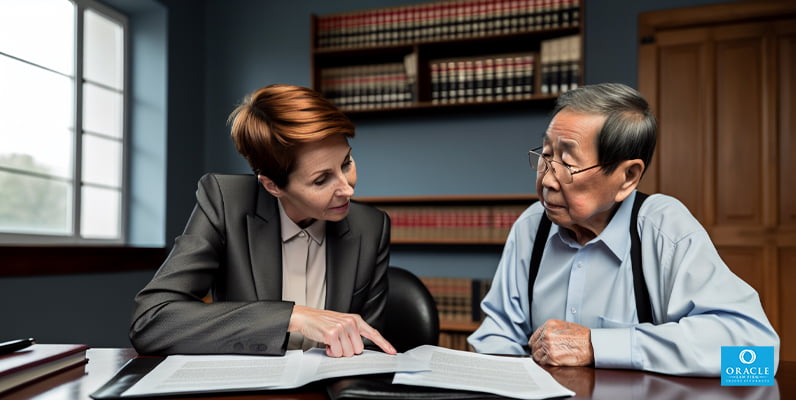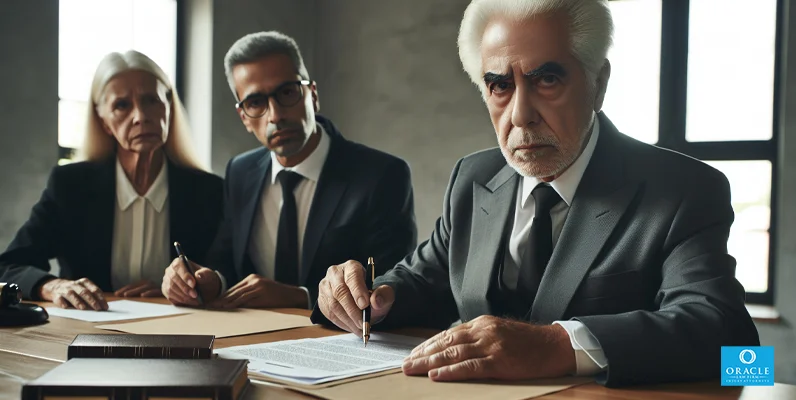As our loved ones age, they may become more vulnerable to elder abuse – a tragic reality that can occur anywhere, from nursing homes to their own homes. It’s a distressing topic, but one we must confront head-on, especially when seeking justice for victims. The ally in this fight? A skilled and compassionate elderly abuse lawyers, who specialize in handling these sensitive cases.
Key Takeaways
- Elderly abuse lawyers are essential to protecting victims’ rights and ensuring justice through investigation, negotiation, and litigation.
- Victims of elder abuse have access to a range of legal options including civil lawsuits, criminal charges, and protective orders.
- Elderly Abuse Lawyers can also assist with reporting the abuse as well as developing prevention plans for future protection.
Understanding Elder Abuse and Its Impact

Elder abuse, as defined by California law, is any harmful act, intentional or negligent, by a caregiver or any other individual that causes harm or a serious risk of harm to a senior citizen. This could happen to elders, dependent adults, and developmentally disabled individuals. Elder abuse is not confined to one form; it can manifest in many ways, impacting the victim’s physical health, emotional stability, and financial well-being.
Building a strong elder abuse case is a key step in seeking justice for the elderly loved one and securing compensation for their subsequent injuries and losses. Recognizing the warning signs of elder abuse is a proactive measure to prevent the situation from deteriorating. Understanding the health and safety code regulations that protect elders can help in identifying and preventing abuse.
Types of Elder Abuse
When we think of abuse, physical harm often comes to mind. However, elder abuse can manifest in many forms, including:
- Physical abuse, which may result in injuries or health complications for those with physical or mental limitations
- Emotional abuse, which can lead to depression, anxiety, and other psychological issues
- Financial abuse, which could rob seniors of their life savings
- Neglect, which can result in severe health and safety risks
Each type of abuse can significantly impact the victim’s health, well-being, and his or her ability to live a fulfilling life.
The underlying cause of nursing home abuse, often manifesting as elder neglect in nursing homes, assisted living facilities, and senior care facilities, is typically to maximize profits. Recognizing these types of elder abuse and understanding their implications is the first step in safeguarding our elderly loved ones.
Prevalence and Consequences
Elder abuse is a widespread issue that often goes unrecognized and unreported. Recent data indicates that approximately one in six individuals aged 60 and older have experienced some form of abuse in community settings over the past year globally. This includes all forms of abuse, including:
- Physical abuse
- Emotional abuse
- Financial abuse
- Sexual abuse
- Neglect
- Abandonment
The consequences of elder abuse are far-reaching and damaging. Elder abuse can lead to severe physical disabilities, injuries, and long-term complications. In addition to physical harm, elder abuse can also result in mental health issues, including depression, anxiety, and a decline in self-reported health. Thus, the importance of addressing elder abuse cannot be overstated.
Selecting an Elderly Abuse Lawyer: Key Considerations

Selecting a suitable elderly abuse attorney is a pivotal step towards ensuring justice for your elderly loved one. This task may appear challenging, but it is necessary for optimizing the case outcome. The right elder abuse lawyer should possess the necessary experience and expertise in elder law and elder abuse cases.
Also, the selected lawyer should demonstrate excellent communication skills and compassion. An effective lawyer will keep you involved in the entire process, ensuring you understand every step and all decisions made are with your express approval.
It’s also important to consider the payment structure for hiring an elderly abuse lawyer. Many law firms work on contingency fees, meaning they are only remunerated if the client obtains a financial recovery on their case.
Experience and Expertise
When selecting an elder abuse lawyer, it is advisable to inquire about the lawyer’s experience in elder law and any relevant cases of elder abuse. Years of experience, coupled with specific expertise in elder law, can significantly impact the outcome of the case. An attorney specializing in elder abuse cases should possess requisite training and experience in dealing with such cases, and it’s imperative for them to be knowledgeable about the particular issues and difficulties associated with elder abuse.
To verify a lawyer’s track record in elder abuse cases, consider investigating if they have any memberships in national consortiums, such as the National Academy of Elder Law Attorneys, Inc. or Elder Counsel. Additional memberships to special committees or accolades in the area of elder abuse litigation can also provide an indication of their competence and dedication in this area.
Communication and Compassion
Elder abuse cases can be emotionally taxing for the victims and their families. As such, having a lawyer who is communicative and compassionate is of paramount importance. A communicative lawyer can provide clarity, keeping you informed about the progress of the case and addressing any concerns or questions you may have. They can also assist an elderly abuse victim in comprehending their rights and options.
Compassion, on the other hand, can provide a sense of emotional support and understanding. A compassionate lawyer can provide empathy, understanding, and emotional support to help the victims feel heard and validated. They will prioritize the best interests of the victims and work diligently to protect their rights.
The Role of Elderly Abuse Lawyers in Protecting Victims’ Rights

Elderly abuse lawyers play a critical role in safeguarding the rights of victims. Their responsibilities extend beyond mere legal representation; they delve into investigating claims, mediating settlements, and engaging in litigation to ensure justice is served for the victims. These professionals can help navigate a complex legal system, enabling victims and their families to focus on healing and recovery.
The role of an elderly abuse lawyer involves:
- Meticulously investigating the claims
- Compiling evidence
- Building a robust case
- Negotiating settlements with the responsible parties
- Engaging in litigation to ensure justice for the victim
The magnitude of elder abuse cases makes the role of an elder abuse attorney even more important, especially when it comes to elder abuse lawsuits.
Investigating Claims
Examining elder abuse claims is a fundamental role of an elder abuse lawyer. The investigation process involves gathering preliminary evidence, conducting in-depth investigations, and giving notice to the parties involved. Evidence is the pillar of any elder abuse lawsuit, and a comprehensive investigation is the first step towards building a strong case.
Lawyers employ diverse tools and resources in their investigation of elder abuse claims. These can include online training resources and tools provided by federal agencies, comprehensive lists of elder abuse resources, and reporting options within each U.S. state, often in collaboration with law enforcement agencies.
Investigations into elder abuse claims usually take a period of several weeks to several months.
Negotiating Settlements and Pursuing Litigation
A competent elder abuse lawyer will:
- Examine the case
- Gather records and evidence
- File a lawsuit
- Send a demand letter
- Conduct a pretrial investigation
- Negotiate diligently to secure a fair settlement
Their goal is to obtain the most favorable settlement for their clients.
In some cases, the course of action may involve pursuing litigation. Lawyers pursue litigation in cases of elder abuse through a variety of legal measures, such as:
- Seeking justice
- Holding abusers accountable
- Filing lawsuits
- Performing the necessary legal work
Whether it’s negotiating a settlement or pursuing litigation, an experienced elder abuse lawyer is instrumental in obtaining justice for the victim.
Legal Options and Remedies for Elder Abuse Victims
Victims of elder abuse have several legal options at their disposal. Depending on the specifics of the case, these can include civil lawsuits, criminal charges, and protective orders. The selection of the appropriate legal remedy is a critical decision that can significantly impact the outcome of the case.
The selection of the right legal avenue demands thoughtful consideration of various factors such as the severity of the abuse, the strength of the evidence, and the openness of the parties to negotiate. An elder abuse lawyer can guide victims and their families through this decision-making process, offering legal counsel based on their professional experience and expertise.
Civil Lawsuits
A civil lawsuit is one legal avenue victims of elder abuse can pursue. In a civil lawsuit for elder abuse, victims may seek compensation for pain and suffering, medical bills, future care needs, and out of pocket expenses. The process involves a series of steps, from consulting with an attorney for an initial case evaluation to submitting a complaint to the relevant court, attending mediation or settlement negotiations, and moving to trial if a settlement cannot be reached.
Though the idea of filing a lawsuit may appear overwhelming, the prospective benefits can be significant. Successful civil lawsuits can result in financial compensation for the victims, holding the abusers accountable, and deterrents against future abuse.
Criminal Charges
In graver instances of elder abuse, the situation may necessitate criminal charges. The potential criminal charges for elder abuse range from misdemeanor to felony, depending on the severity or type of offense committed. Penalties for elder abuse under criminal law can include monetary fines and incarceration.
The legal implications of elder abuse, including financial exploitation, in the criminal justice system are complex and can involve addressing complex medical and financial matters, as well as assessing the competency of the victim. Despite the challenges, pursuing criminal charges can be a powerful way of holding abusers accountable and preventing future abuses.
Protective Orders
When immediate safety measures are required, protective orders can serve as essential support. A protective order in elder abuse cases is a legal document issued by a judge to safeguard older adults from abusive individuals. It provides legal protection and strictly prohibits the abuser from contacting or approaching the elderly person.
Obtaining a protective order involves the following steps:
- Collecting evidence
- Notifying the relevant authorities
- Submitting a petition
- Attending a hearing
- Presenting evidence
- Securing the protective order
A lawyer can provide assistance in this process, offering legal advice and representation to safeguard the victim’s safety and protection, especially when a family member is involved.
How Elderly Abuse Lawyers Can Assist with Reporting and Prevention

Elder abuse lawyers play a significant role in reporting and preventing elder abuse. By notifying the relevant authorities of the abuse and assisting in the creation of a prevention plan, these legal experts can help shield elderly individuals from subsequent harm.
Reporting elder abuse is the first step in holding abusers accountable and safeguarding the rights of senior citizens. Lawyers assist in this process by gathering evidence, documenting the abuse, and filing a report with the appropriate authorities. This is a crucial step in ensuring the safety and well-being of the victim.
Reporting to Adult Protective Services
Adult Protective Services (APS) plays a key role in addressing elder abuse cases. APS is tasked with:
- Investigating allegations of abuse, neglect, and exploitation of elderly individuals
- Responding to reports of abuse
- Ensuring the protection of senior citizens
Reporting abuse to APS is a crucial step in ensuring the safety and well-being of elderly individuals.
An elder abuse lawyer can assist in the reporting process, providing guidance on gathering evidence, documenting the abuse, and contacting the appropriate authorities. The response from APS typically involves carrying out an investigation to evaluate the safety and welfare of the elderly individual, providing services and interventions to prevent further abuse.
Developing a Prevention Plan
Apart from addressing current cases of abuse, proactive steps can contribute to averting future instances of elder abuse. An elder abuse lawyer can contribute to the development of an elder abuse prevention plan by:
- Offering legal counsel
- Performing risk analyses
- Formulating policies and protocols
- Instructing staff and caregivers
- Representing victims.
A comprehensive prevention plan can facilitate the elderly’s comprehension of their rights, supply support and resources to stave off abuse, execute tactics to avert abuse, assist in preserving their assets, and devise a safety plan to confront and prevent abuse. By engaging with a lawyer in developing a prevention plan, elderly individuals and their families can equip themselves with the tools and knowledge to recognize and prevent potential abuse.
Summary
Elder abuse is a pervasive issue that calls for prompt intervention and legal action. Choosing the right elder abuse lawyer is crucial in ensuring justice and support for victims. Through their expertise in elder law, experience in handling elder abuse cases, and their compassion and communication skills, elder abuse lawyers play a vital role in protecting victims’ rights. They assist in investigating claims, negotiating settlements, pursuing litigation, and reporting abuse to authorities. They also provide guidance on legal options and remedies and help in developing prevention plans, thereby offering a comprehensive approach to addressing elder abuse.
Frequently Asked Questions
What are the 6 types of elder abuse?
Elder abuse comes in many forms, including physical abuse, emotional or psychological abuse, sexual abuse, neglect or abandonment by caregivers, financial exploitation and healthcare fraud and abuse.
What is an example of mental abuse in the elderly?
Mental abuse of the elderly often involves emotional manipulation and belittlement such as yelling, bullying or blaming them for things they didn’t cause.
Who investigates elder abuse in California?
In California, Adult Protective Services investigates reports of elder abuse, neglect, and exploitation, while the Office of the State Long-Term Care Ombudsman looks into claims of nursing home abuse and neglect.
What is the law for neglect of the elderly in California?
In California, elder neglect is a felony punishable by up to 10 or 15 years in prison and a fine of $10,000. Depending on the severity of the crime, individuals can be convicted for physical abuse, neglect, financial neglect/exploitation or sexual abuse by their caretaker.
What are the key considerations when selecting an elderly abuse lawyer?
When selecting an elderly abuse lawyer, it is important to consider their experience and expertise in elder law and elder abuse cases, communication skills, and compassion. An effective personal injury lawyer will involve you throughout the process and ensure all decisions are with your approval.






